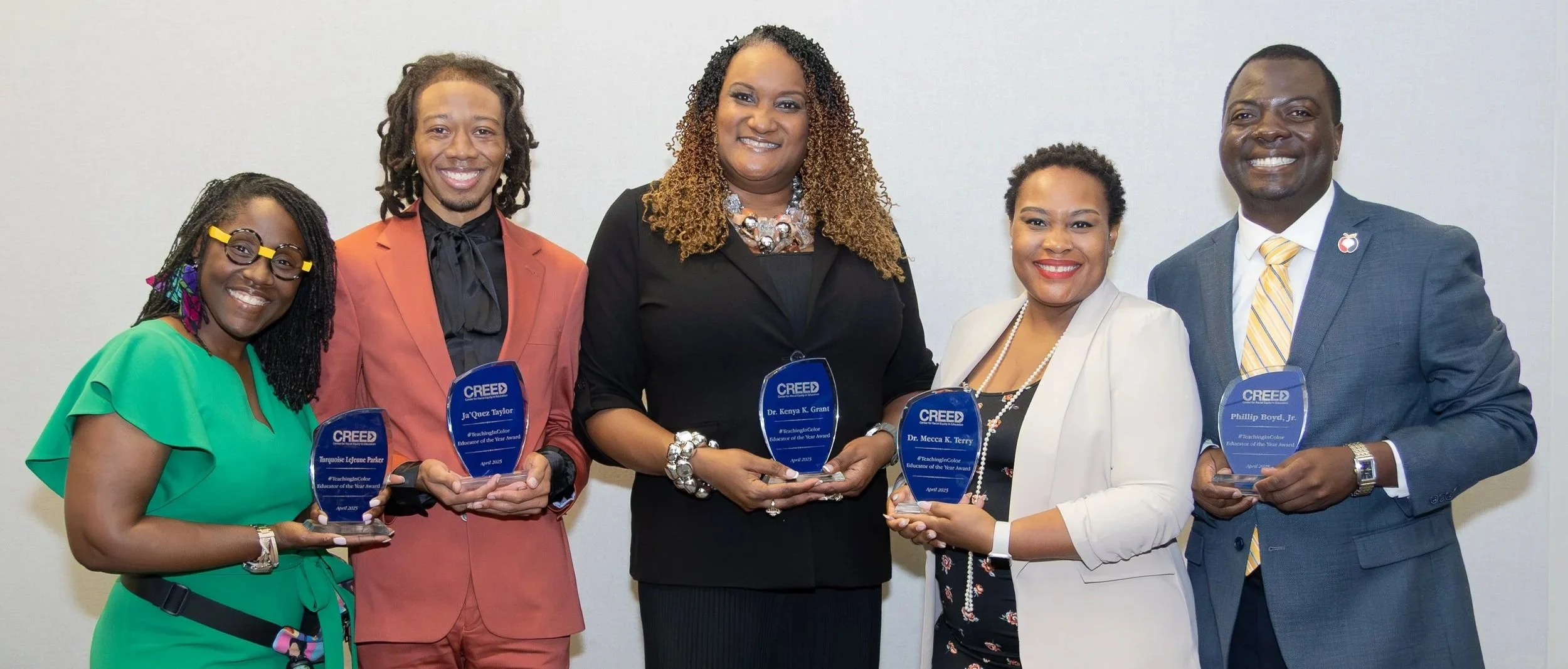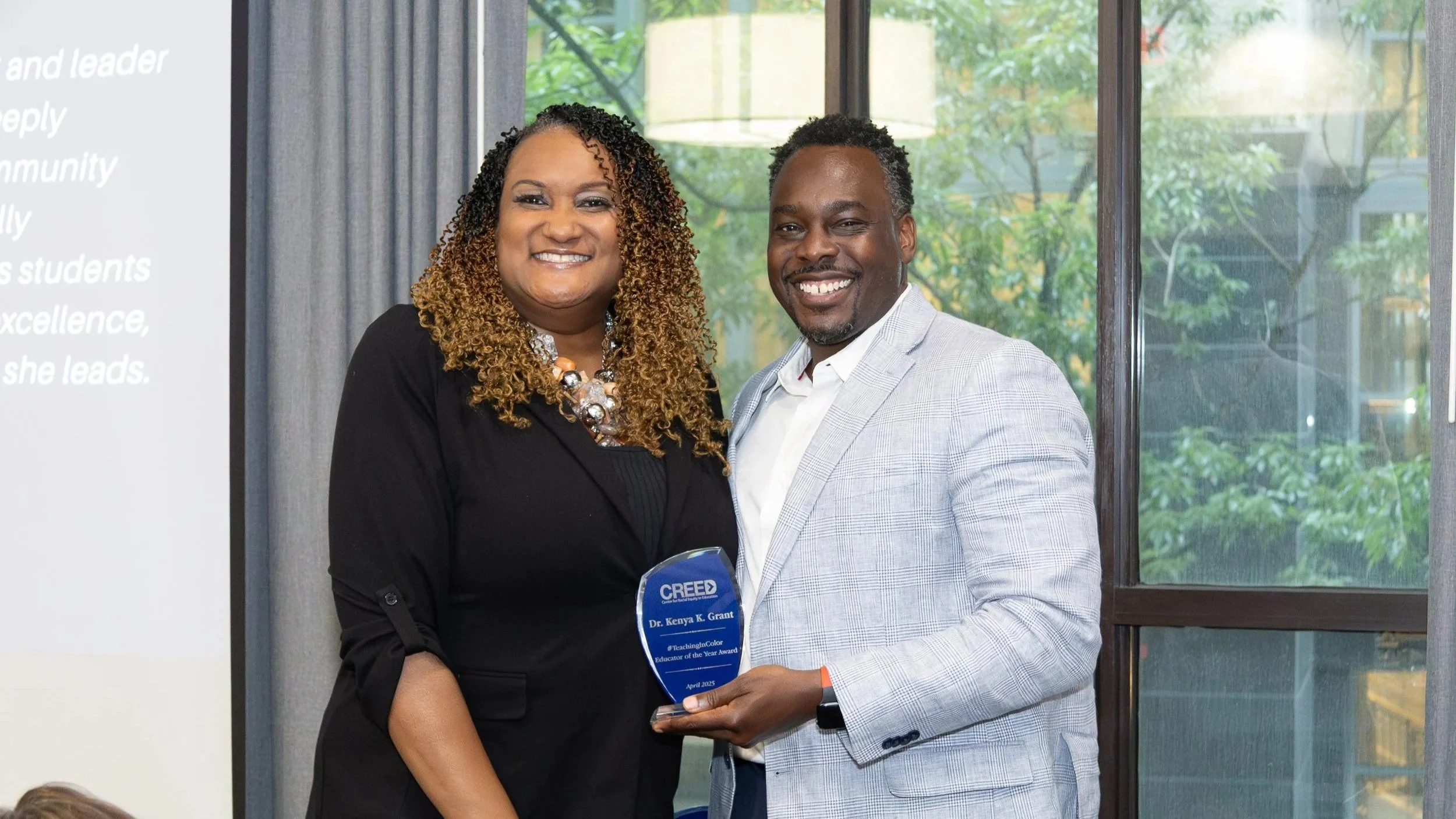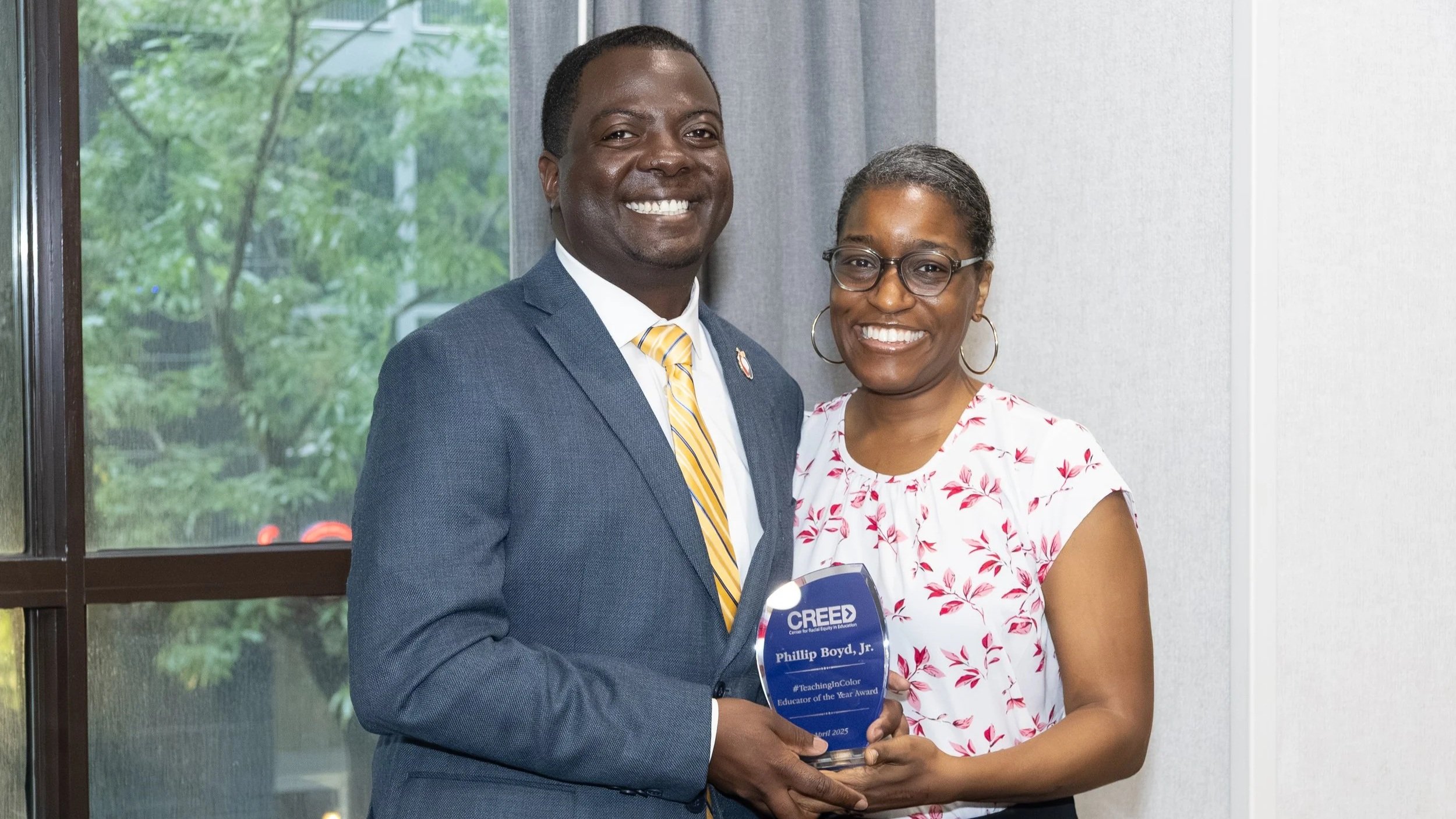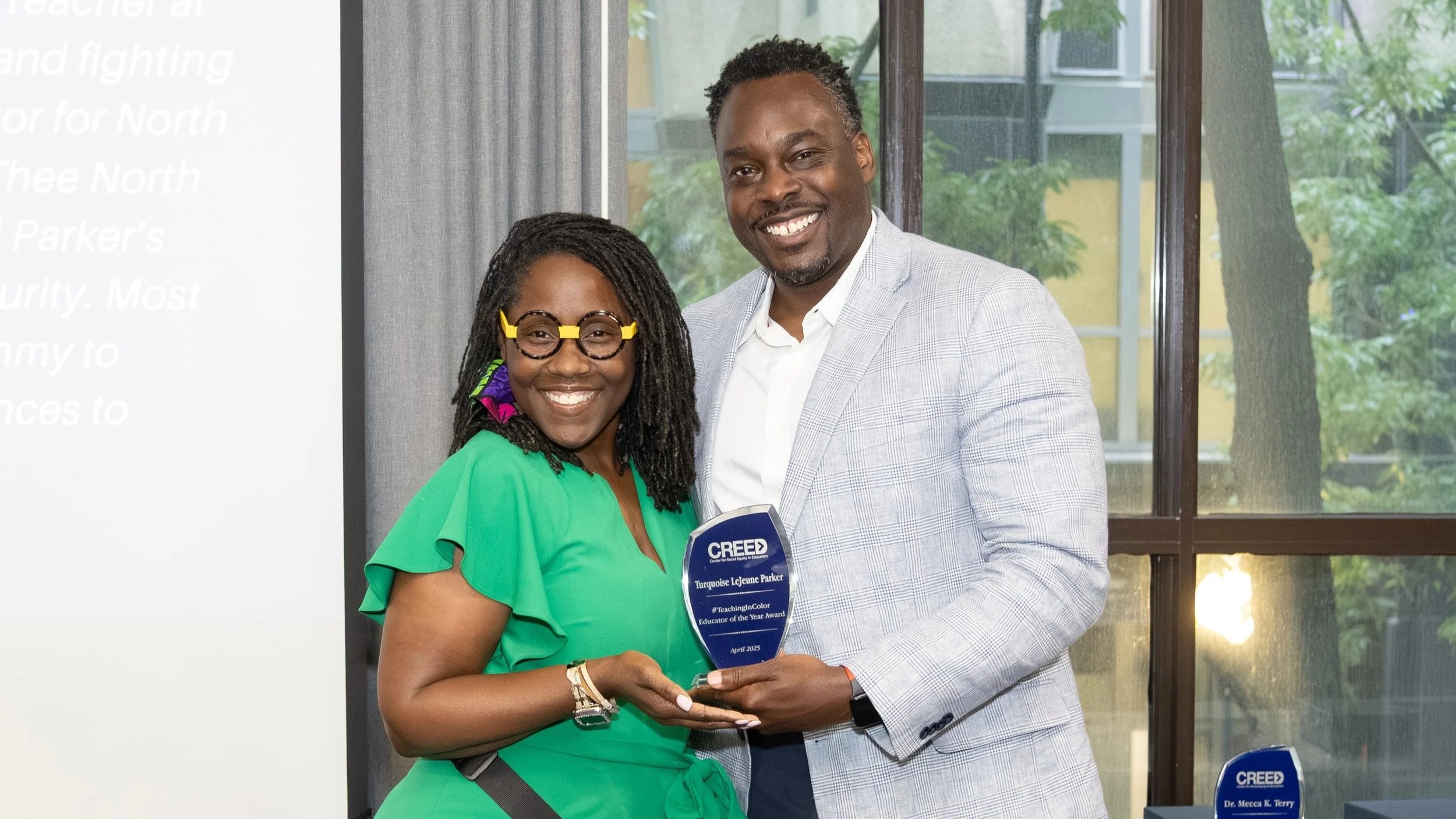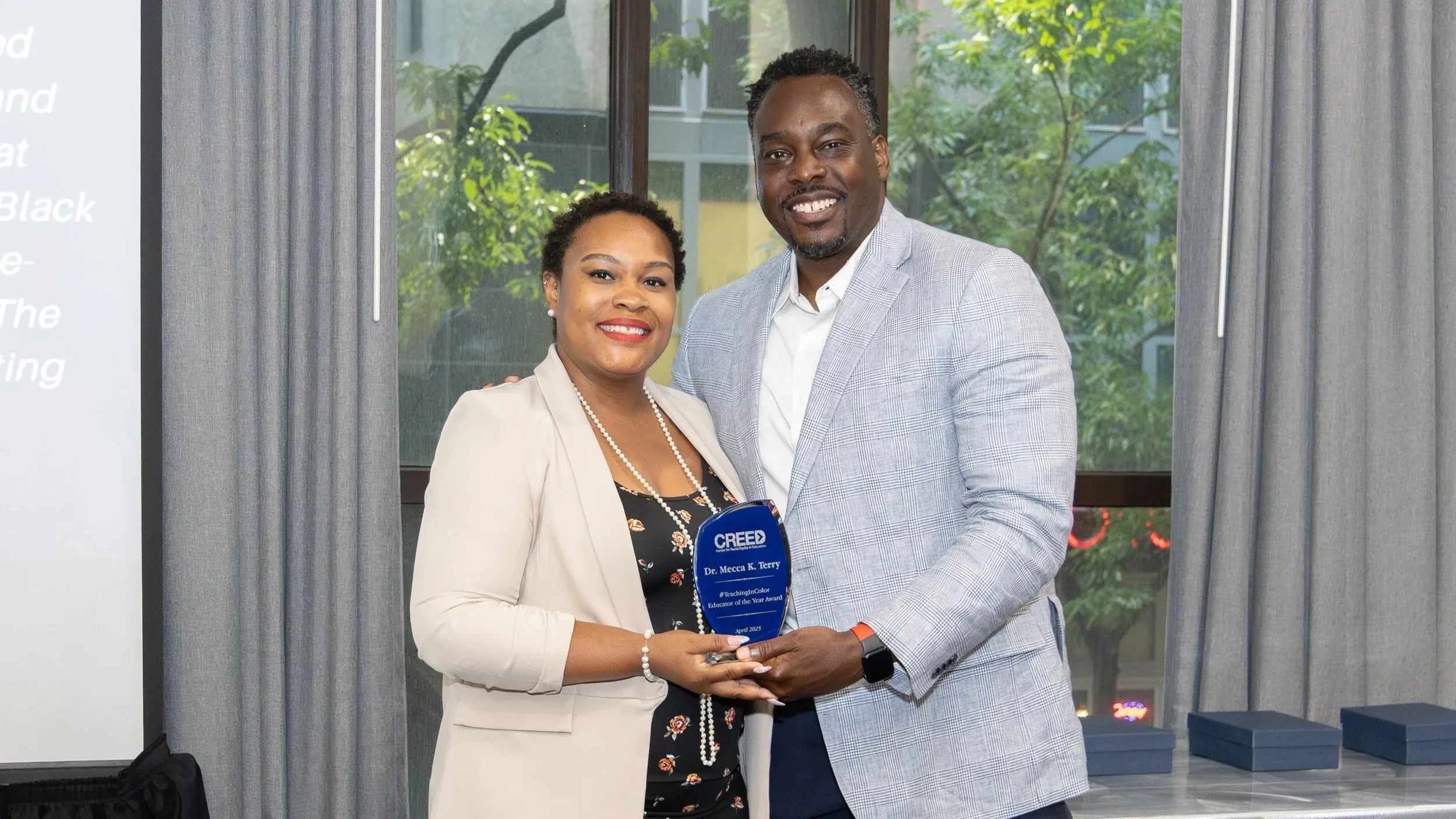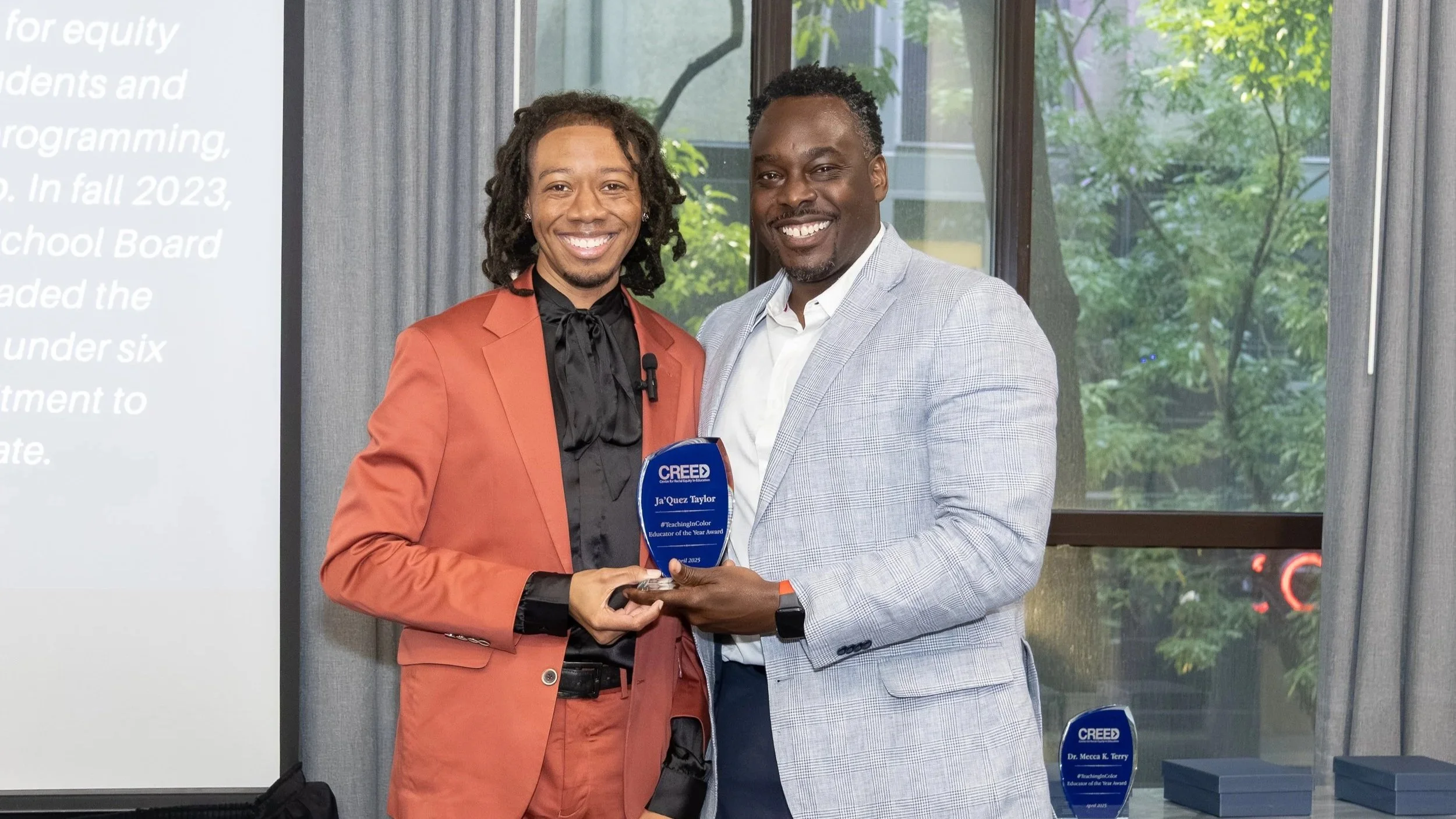More Than Just a Seat at the Table: 2025 Educators of the Year share insights on equity and excellence in education
2025 Educators of the Year at the 4th annual #TeachingInColor Summit in April 2025; Pictured left to right: Turquoise LeJeune Parker, Ja'Quez Taylor, Dr. Kenya Grant, Dr. Mecca K. Terry, and Phillip Boyd, Jr. | Photo by Kelsey Lam
CREED’s annual #TeachingInColor Summit is a space for North Carolina's educators of color to learn from and inspire one another in pursuit of bettering the classroom. At this year's conference in Charlotte, Dr. Kenya Grant, Dr. Mecca K. Terry, Ja’Quez Taylor, Turquoise LeJeune Parker, and Philip Boyd, Jr. were bestowed an “Educator of the Year” award, recognizing their work and overall contributions to breaking barriers in education.
Dr. Kenya Grant, who is the principal of Northside Elementary in Warren County, says that to her, teaching in color means creating spaces where access is not a barrier, but rather a given.
With COVID, Dr. Grant began to notice the disparities in school systems when it came to technology, literature, and more. That fired up her mission to provide teachers in rural and underserved areas with the tools and culturally-responsive curriculum they need to best serve their students. Currently, a focus of her educational consulting firm, Access GrantEd+, is supporting international teachers who come into the U.S. with coaching, lesson planning, classroom management skills, etc.
Dr. Grant recognizes that in a world that might view diversity, equity, and inclusion as bad words or something forced, it is actually one of our biggest superpowers. She would even go as far as saying that representation saves lives.
“I say to my staff that we are mirrors and models, and that has to do with recruiting, retaining and uplifting educators of color,” Dr. Grant said. “It is not just something that we do as a checkbox, right? I think it's a moral and academic imperative.”
Phillip Boyd, who is a Family and Consumer Sciences teacher with Winston-Salem/Forsyth County Schools, shares Dr. Grant’s sentiments. As a black male educator teaching a subject that is traditionally female-dominated, he hopes to inspire students to expand the boundaries of what they believe is possible.
“At the district level being the only male that teaches Family and Consumer Sciences, my director told me, ‘You're a unicorn. There's nobody else doing it, literally nobody doing it,’” Boyd said.
Through his role and work as an educator, he succeeded in getting more young men to enroll in his class and others in the subject area, helping to break the existing gender stereotype.
Boyd attended NC Central University, where he was recommended to join the Family and Consumer Sciences program because it aligned with his interests. After college, he wound up going to get a Master's in Student Affairs, but did not enjoy it because Black men were not frequently being hired in the field. Upon rethinking what his true passion was, he applied and was chosen for a food and nutrition teacher position in his hometown.
Aside from his teaching, Boyd also serves as a North Carolina Impact Leader for Profound Gentlemen, which involves supporting male educators of color across the state in areas like Winston-Salem, Charlotte, and Fayetteville. In this role, he serves as a peer mentor, meeting with educators to offer resources and guidance when it comes to classroom management and best teaching practices.
Turquoise LeJeune Parker, who is a media coordinator at Lakewood Elementary, also serves in a similar leadership role as a NEA (National Education Association) director for North Carolina. In that position, she lobbies on Capitol Hill with the organization and attends meetings where she can relay the concerns and experiences of other educators to leaders in power.
“I've been to the White House twice since I've been an NEA director, gone to Harvard several times, and spoken at multiple historically black colleges, just to elevate these things,” Parker said. “Listening is a huge part of the job as well.”
Working in her school’s library, Parker loves her job because of her ability to support every student in the building, not just those in one class. Understanding that many people of color are discouraged from entering the teaching profession due to systemic barriers, Parker hopes to harness her advocacy and teaching to pave the way for more representation in schools.
“I always say that you cannot be what you cannot see,” she said.
Also being a graduate of NC Central University, she also emphasizes to her students that historically Black colleges and universities (HBCUs) are prestigious and standards of excellence, despite a lot of the focus sometimes being shifted to predominantly white institutions.
“The standards, expectations, and responsibilities that we have are different than our colleagues who graduate from predominantly white institutions, because we bring in a lens that is just totally different.”
She also encourages her students to feel like they can be authentically themselves with wherever their life takes them after high school.
“There's no one way to be Black, and that's the dopest part about going to a historically Black college,” she said.
Dr. Mecca K. Terry adds another unique perspective to this year’s Educator of the Year lineup, being a professor at the college level. Within her PhD program, Dr. Terry found that there was a gap in literature for marginalized communities relating to their perceptions of law enforcement. Therefore, she chose to focus specifically on Black women's views of law enforcement in urban communities, including subjects’ personal interactions with the police, perceptions based on what is shown in the media, etc.
Like Parker, she is also a staunch activist within her community, especially when it comes to pushing for the CROWN Act which would ban appearance or hair-based discrimination in schools.
“There have been cases where individuals in higher education and also K-12, where they have been banned from participating in certain extracurricular activities because of their hair type, and so it's a subject that I'm very passionate about,” Dr. Terry said.
Her nonprofit, Embracing My Natural, Inc., provides workshops on hair care, head wrapping, and other subjects relating to natural hair care and self esteem for people of color.
At UNC Pembroke, Dr. Terry teaches courses about policing and re-entry corrections. What makes her work especially unique is how her teaching is informed by her personal experiences working in the justice system.
Dr. Terry interacted with inmates on a day-to-day basis and provided them with resources so that they were able to reintegrate back into society.
“My experience as a probation officer was very fundamental also to how I look at re-entry and individuals who were incarcerated and now coming into the community,” she said.
Sharing these experiences has allowed her to have students that more deeply understand the perspective of those that have been incarcerated. Every semester, she even takes her students to revisit a reentry center so she can incorporate service learning into the class.
This year's final EOY awardee, Ja’Quez Taylor, became the youngest elected school board chair in North Carolina in 2023. After turning down a job in D.C., he saw an opportunity to lead during a pivotal moment in the Thomasville City Schools district since it had just transitioned from an appointed to an elected school board. Only five people filed to run, and with encouragement from his colleagues, he stepped into the chair role on a 3-1 vote.
When it comes to his legacy as an educator, Taylor wants to be remembered as a true and faithful servant to students and families, and who was someone always investing into their success and well being.
Over the last two years, Taylor has also been running his own tutoring business, FuturePrep, LLC, which has helped to make substantial progress in the educational journey of students in his district.
“You always leave something better than you found it,” Taylor said.
He encourages students of color who want to work in education to follow their heart and passion, and not to solely focus on the pay.
“Ask for help along the way, and start investing, not just in teaching and learning, but also in yourself,” he said.
Hailing from different counties and areas of expertise, these educators are a vibrant, talented display of what it truly means to "teach in color."
#TeachingInColor is a professional learning network of educators dedicated to building community, supporting, and advocating for policy changes in the best interest of educators of color and the students they serve. Our #TeachingInColor Summit, held every year in April, is an annual gathering for educators of color from across North Carolina to fellowship, exchange ideas, discover best practices, and uplift each other.
Jaya Nadella is a rising sophomore at the University of North Carolina Chapel Hill. She is majoring in Political Science, with a prospective double minor in PPE (Philosophy, Politics, and Economics) and Media and Journalism. She hopes to harness her passion for writing as a tool for driving change, and has dreams of attending law school after undergrad. Jaya joined CREED in 2025 as the Summer Communications & Marketing Intern.


